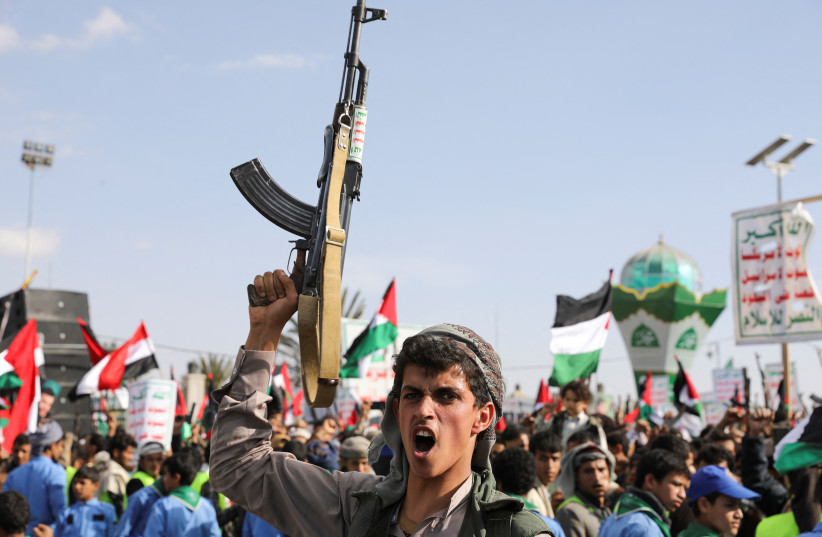Anyone familiar with the Houthi group and its decades-long evolving relationship with Iran knows that the decision on how to respond to the recent attacks by the US and its allies on Houthi infrastructure is not in the hands of Houthi leader Abdul-Malik al-Houthi. It merely will be his advisory opinion or that of his comrades.
Therefore, the discussion should focus on Iran’s expected response. The US recognizes that its attacks on Houthi-controlled areas of Yemen are not, in fact, crushing strikes but messaging. It is about letting the main sponsor know that there is a target that can be bombed by the Operation Prosperity Guardian coalition.
More importantly, the Biden administration wants to reaffirm its resolve to defend its policies and positions, and prove that it is capable of resorting to force if necessary. In the past, this has been doubted not only by Iran, but also by all of Washington’s allies in the Middle East, without exception.

The stick may have been effective lately, but the carrot no longer is for the Iranians, considering its nuclear program and regional influence. Instead, it is simply “damage control,” i.e., not taking action against Iranian proxies and preventing Israel from taking military action against them.
We must recognize that the Houthis, who are supported by the Iranians, do not really seek direct confrontation with Israel or the US coalition. However, they will not give up the publicity and political gains they have achieved by announcing the shelling of ships and naval vessels bound for Israel in support of the Palestinian people.
The Houthis, therefore, will continue this futile game as long as they can act as a rival not only to Israel, but also to the major international powers. Attacks by the coalition on Houthi bases in Yemen will certainly not be enough to stop their operations in the Red Sea.
Iran still has an opportunity to test the resolve of the Biden administration and its ability to escalate the ongoing conflict in Gaza, especially given the lack of agreement by regional US allies, particularly Saudi Arabia, to open a new regional front in Yemen.
Iran playing complex regional game
It is likely that the Houthis will indeed resume their attacks on ships, and perhaps intensify them against US and British naval units. This is an extremely propagandistic war game, and part of a complex game of regional and international card-shuffling, orchestrated by Iran.
Its intent is to lead to new agreed-upon security measures in sea routes, providing Iran and its proxies with influence commensurate with the threats they pose to global security. To be sure, US and British operations against the Houthis open the door to a variety of scenarios.
But objectivity requires recognizing that the Houthis have left no one with a choice in this matter. The problem of threatening the security of a vital sea passage like the Bab el-Mandeb Strait cannot simply be ignored. There is no justification for continuing to threaten shipping in the strait and the Red Sea, even if the stated purpose is to call for an end to the fighting in Gaza.
Such practices have a negative impact, diverting attention from what is happening in the Palestinian territories and undermining international sympathy for Palestinian civilian casualties. The protection of just causes cannot be achieved by illegal means or harm to others, as in the case of attacks on ships and international commerce which are solely based on suspicion that they belong to Israel or have an Israeli owner.
Iran has put itself in a strategically difficult and highly complex position by allowing its proxies to open all fronts at once. Even if the escalation by these proxies is very carefully calculated, it poses a threat to both Israel and the world, as in the case of the Houthi attacks.
As a result, Iran faces catastrophic scenarios in which there is the possibility of destroying all of its regional proxies at once, or at least eliminating their ability to act and exert influence. This could force Iran to intervene directly to protect its massive investment in these proxies, considering that the fate of its regime is largely tied to the fate of these agents.
This would put Tehran in a scenario that it has been trying to avoid for a long time, namely engaging in open and direct war with its strategic adversaries. This would come at a time when it cannot wait for an international stance to calm a potential conflict. Although China’s relations with the US deteriorate, Beijing wants to stay out of the ongoing conflicts in the Middle East, as evidenced by its response to the war in Gaza. Added to that is Russia’s inability to provide diplomatic or military support to its Iranian ally.
There is optimism that the conflict can be prevented from escalating due to the US reliance on the Iranian regime’s realism and its continued inclination to defend its interests when threatened.
Washington, therefore, continues to send Tehran indirect signals through proxies to avoid fueling a regional conflagration that would be difficult to control.
The writer is a United Arab Emirates political analyst and former Federal National Council candidate.
